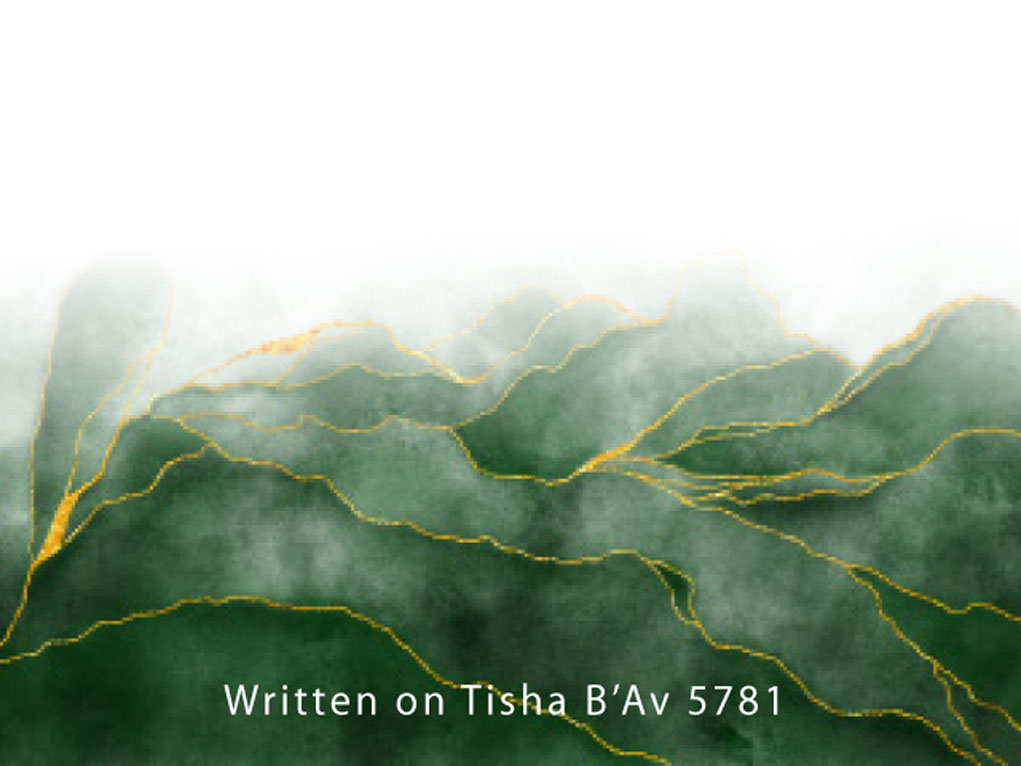Today, we are sad.
Each day, we must internalize the gift of being born into light. But today, we dwell on the pain of causing darkness. Every day, our heart fills with the knowledge of who we are and what we have been given. Today, we face the emptiness of who we are not and what we have no longer.
The Bais Hamikdosh provided us not just with closeness, but with the clarity that true attachment breeds. Am Yisroel knew their worth and the responsibilities that came with it, and if for a moment we forgot, there was a place to go and remember.
We imagine how life would be, guided by a Father who no longer needs to hide His face, to be able to bask in His glory, and reflect of it to the rest of the world. If only we had a spot to set down our burdens, to renew our vows, and our eternal commitment to bring kedusha down here.
The Kohanim would serve, the Levi’im would sing, and we would all know our place in the world. We would embrace that place in the world.
In the space of such light, we would live alone on the higher plane intended for us, unconcerned with finding the creases in society where we deceive ourselves into thinking we also belong.
The nations of the world understood this then, too. We would not be forced to engage in hasbara, as the times today require. There would be no need to attend education initiatives or sit with the media to make our voices heard, no meetings with government officials to explain our philosophy and hear theirs.
The beauty of a life lived for Him and His Will would suffice to give us a sense of mission, and leave over enough to share with a world filled with aching confusion.
Eicha yoshvah bodod, we cry. Am levodod yishkon, we sing.
In times of golus, Eicha yoshvah bodod, a nation apart, torn from its source, and of no recognizable influence on the world. A people persecuted, mocked, and misunderstood. The Torah languishes in the proverbial keren zovis, and our leaders are painfully plucked, one by one. Hashem speaks to us, but we have no idea how to listen.
Ghettos, barracks, pogroms, and concentration camps; or Range Rovers, mansions, and private jets.
Separated by fear, or by a chase for fleeting pleasure.
Sometimes bitter and filled with pain, and sometimes sweet and al sir habosor, but in golus, we are always alone.
Hakadosh Boruch Hu has decreed that we live apart. It is for how that loneliness is expressed in exile that we mourn.
In times of geulah, am levodod yishkon, a nation apart, like kings who live separately and higher. People of the book, removed from pursuits of the earth for its own sake, and simultaneously a light unto the nations who see meaning in nothing else.
The gaavah d’kedusha of ki vonu vocharta, the purity of ki im l’yira, and the aloof nobility that Mamleches Kohanim demands. A time when our mission is clear, and the fact that we were entrusted with it, a source of jealous admiration from those not so privileged.
Shechitah, kabbolah, holacha, and zerika. Nevua, Sanhedrin, and Malchus Bais Dovid. Separated by a dedication to a higher calling, and a sacred responsibility to prepare a place in this world for the Shechinah to reside.
Sometimes b’ahava and sometimes b’yirah, but in geulah we are always alone.
Hakadosh Boruch Hu has decreed that we live apart. It is for how that separation is expressed in redemption that we yearn.
When a Jew loses a loved one, he sits on the floor. In the throes of his pain, and while he mourns, we come to offer nechomah. It is from this deep sense of support that he draws the strength, once shivah has passed, to stand once again.
On Tisha B’Av, we collectively sit on the floor, and kevayachol, so does He. But here it seems different. We begin to sing Nachamu only after the day has passed. The work of nechomah seems not to begin until the aveilus is gone.
From where are we to draw that energy to get back on our feet? Where is the encouragement today that there will be a better tomorrow? What gives us the strength, while we are sitting, to eventually stand?
Today, on Tisha B’Av, I chanced upon some bochurim singing from a place deep in their hearts. These were boys who are struggling to find their place in the world, to understand what it all means. And they were singing Ani Maamin, V’leYerushalayim Ircha, and Shifchi Kamayim Libeich, full throated, with emotion and love. They were expressing their neshomah’s deep desire to be alone with Him.
It is through such yearning that comfort is sown.
Perhaps, the nechomah to go on is realized by observing how we, as a people, mourn. It’s been thousands of years, yet we still sit on the floor, crying, and praying. We have not forgotten, and we have not stopped believing.
The sorrowful cry of Eicha still resonates, and the promise of am levodod yishkon continues to beckon.
We know what it’s like to be alone in golus, and today we long to be alone in geulah.
We are sad today, but what a meaningful sadness it is! A nation apart, who today expresses together, each individual in their separate corner, how much we still understand the blessing that our separation brings.
From the hopefulness we find in sitting alone yet again comes the strength to stand yet again, together as one. Am Yisroel rises rejuvenated, and stands upright and tall, with the pride of am levodod yishkon pounding in our hearts.
And together, we wait to hear those words of nechomah that we know are coming, the words we have faithfully waited to hear all these years – alone.
Nachamu, Nachamu Ami.
Bemeheirah beyomeinu. Amein.








